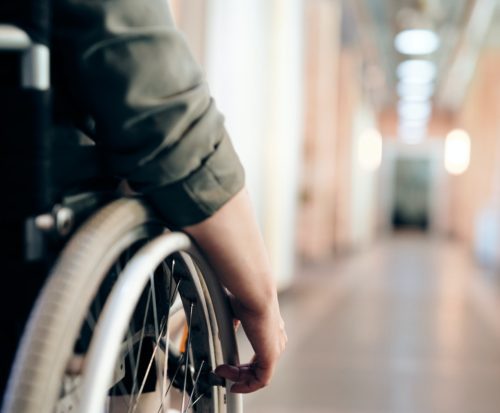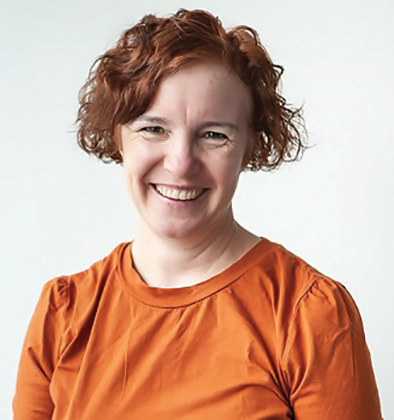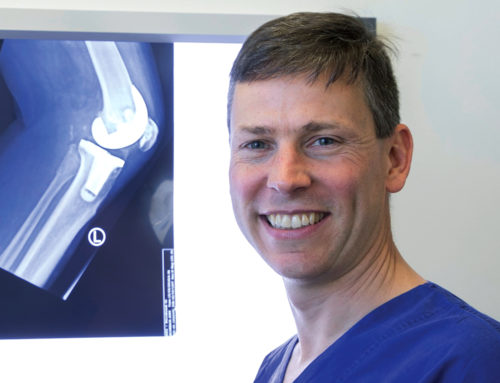 It’s time to see the ability in disability, is the core message of this year’s annual International Day of People with Disability (IDPwD) on December 3. This is a sponsored post.
It’s time to see the ability in disability, is the core message of this year’s annual International Day of People with Disability (IDPwD) on December 3. This is a sponsored post.
IT’S time to see the ability in disability, is the core message of this year’s annual International Day of People with Disability (IDPwD) on December 3.
The initiative was founded by the UN in 1992 and has since been observed around the world, including in Australia, where the government started funding it in 1996, and continues to today in recognition of the 4.4 million Australians who live with a disability.
The day’s aim is to highlight the achievements and contributions of people with disability and to increase public awareness, understanding and acceptance of those people living with disability through online testimonials and personal stories.
This year, with the coronavirus pandemic impacting events, the initiative is calling on people to share stories on social media by using the #disablestereotypes hashtag.
Visit idpwd.com.au
Dealing with pain from the inside, out

WHEN it comes to managing chronic pain, illnesses and disabilities, Arthritis ACT focuses on the whole person – mind and body – in order to get vital outcomes, says CEO Rebecca Davey.
It’s about looking at pain in a holistic way, not just addressing pain through management or treatment but also the psychological components to pain, believing that if the mind is hurting, so too will the body, says Rebecca, ahead of the International Day of People with Disability.
“What we find is if you’re not treating your mind as well as your body then your body is going to suffer,” she says.
“If you’re not treating the whole person, you’re not going to get a vital outcome.”
At Arthritis ACT, which supports anyone suffering from chronic pain, illness or disability, not just arthritis and joint pain, including those on NDIS, DVA and My Aged Care, it helps people work towards managed solutions in the future, says Rebecca.
Arthritis ACT’s programs also address the sense of isolation and anxiety many chronic pain sufferers feel through support group sessions or one-on-one meetings, she says.
One of the programs, its art therapy sessions, are most popular among people living with a disability, says Rebecca.
“Any of our practitioners can be seen by anyone no matter their disability,” she says.
“We support people that are just doing it really tough and don’t know where to turn.”
Arthritis ACT, 170 Haydon Drive, Bruce. Call 1800 011041, email info@arthritisact.org.au or visit arthritisact.org.au

Taking care of carers
THE Carer Gateway is a way to support carers across Australia who are looking after a family member or friend and are often unseen despite their considerable contribution to society, says Carers ACT chief executive officer Lisa Kelly.
The Australian government initiative connects the nation’s 2.65 million carers who might be looking after someone with a disability, a medical condition, mental illness or frailty from old age, with in-person, phone, and online services, and anyone in the ACT that uses the service will be greeted by Lisa’s team at Carers ACT which is a service delivery partner of Carer Gateway.
The service provides carers with coaching, counselling, respite care, connection with other carers and their stories, and online skills, and helps promote carer wellbeing, says Lisa.
“The Carer Gateway [service] provides information and advice on the support available to carers across Australia, and has a great range of online resources to help promote carer wellbeing,” Lisa says.
“In accessing the Carer Gateway [service], we go through a process, talking through their needs and what’s impacting them the most, and then devise an action plan to rebalance the carer’s load.
“It might be accessing respite, peer support or education to help with caring like correct lifting, for example.
“Often carers don’t reach out for support for themselves, and many aren’t even aware that they can, or that there is so much available.”
Carers ACT, call 6296 9900, email carers@carersact.org.au or visit carersact.org.au. Carer Gateway, call 1800 422737 or visit carergateway.gov.au
Helping Canberrans resolve their complaints

CANBERRANS can complain to the ACT Human Rights Commission about abuse, neglect or exploitation of a vulnerable person, says ACT discrimination and community services commissioner Karen Toohey.
A vulnerable person is anyone older than 60 years of age, someone who has a disability or impairment, or is socially isolated, she says.
There are several different ways the commission responds to complaints, including anonymously or confidentially, says Karen.
“A complaint can be made by the vulnerable person, a carer, friend, family member, service provider or other person concerned about the vulnerable person,” she says.
“You can call us for information and to have a confidential discussion about options, or you can make a complaint.
“We can talk through options for trying to resolve the concerns informally, provide information and referral options.
“This might include referral to advocacy services or legal advice, the Public Advocate, or helping you liaise with service providers.”
In the ACT, people with a disability are protected from unfair treatment, bullying, harassment and vilification under the ACT Discrimination Act.
ACT Human Rights Commission, level 1, 5 Constitution Avenue, Civic. Call 6205 2222, email human.rights@act.gov.au or visit hrc.act.gov.au
Team explore options to improve pain and functional capacity

CANBERRA’S largest orthopaedic practice, Orthopaedics ACT can help those with musculoskeletal disorders and disabilities affecting movement and mobility, says orthopaedic surgeon Dr Phil Aubin.
“Care at Orthopaedics ACT centres on establishing a diagnosis of the underlying disease and its associated musculoskeletal manifestations,” he says.
“Our goal is then to explore and implement both non-surgical and surgical treatment options to improve pain and functional capacity.”
All the orthopaedic surgeons at Orthopaedics ACT deal with musculoskeletal and neurological diseases that cause disability.
“Pain relief and improvement in functionality capacity are the main goals of orthopaedic surgery,” Dr Aubin says.
“Surgery can very often improve the pain and impairment associated with musculoskeletal disability.”
Other experts on the team are Assoc Prof Chris Roberts (trauma, sport, hand, wrist, elbow, shoulder), Prof Paul Smith (trauma, pelvis, hip and knee), Dr Nicholas Tsai (trauma, spine, hip and knee), Dr Al Burns (trauma, sport, knee and hip), Dr Gawel Kulisiewicz (trauma, sport, hip, knee, foot and ankle), Dr Igor Policinski (microsurgery, hand, wrist, elbow and shoulder), Dr Larissa Trease (sport and exercise medicine), Prof David Little and Dr Samya Lakis (paediatric orthopaedics), and pain management specialist Assoc Prof Tillman Boesel.
Orthopaedics ACT, Woden Specialist Medical Centre, Level 2, 90 Corinna Street, Woden. Call 6221 9320 or visit orthoact.com.au
Supplies bring comfort and security
WHEN Capital Rehabilitation Supplies was established last year, there was a gap in affordable and useful services for sick and recovering patients, says manager Tim Robinson.
Based out of their Mitchell showroom, Tim says they’re the only family-owned rehabilitation supplier in Canberra with a range of everyday living aids for Australians living with a disability or an impairment, frailty in old age, or for people who are in recovery.
People should be able to afford treatment and have the right to live comfortably, according to Tim, who says their extensive range also caters to those on the NDIS scheme as Tim and his team are a registered provider for NDIS equipment and consumables.
Products include mobility aids such as electric lift chairs, height-adjustable chairs, and other patient lifting equipment, as well as mobility scooters.
They also sell comfort and support products such as pressure care cushions, mattresses, home care and electric hospital beds, and bathroom products, says Tim.
With years of knowledge in the industry, Tim wants to bring comfort and security to peoples lives but knows that dealing with some issues can be sensitive, so it’s their delicate and helpful approach that sets them apart, he says.
“In doing this, we hope to bring comfort and security to people’s lives with our large range of aged care and rehabilitation equipment [which] we believe can help,” says Tim.
Capital Rehabilitation Supplies, 3/66 Heffernan Street, Mitchell. Call 6174 4813 or visit capitalrehabilitationsupplies.com.au
Pegasus back to pre-covid classes

PEGASUS Riding for the Disabled has been able to welcome back almost all of its participants following months of suspended classes because of covid, says executive general manager Matthew Watson.
“Except for our ‘Hippotherapy’ classes, which is physiotherapy on horseback, we are back to pre-covid times and couldn’t be happier, as it was a long stretch without people being able to attend,” he says.
“We’ve had a core team here to look after the horses, but it’s not the same without our participants and volunteers.
“The volunteers love being here as much as the participants.”
Serving the ACT and local NSW region, Pegasus provides specialised horse-facilitated therapy programs and activities for people living with disabilities, including mounted riding and unmounted horse management programs. Matthew says that Hippotherapy is on the cards to be back up and running by 2021.
Pegasus says that its horses and the interactions with them is what makes them unique.
“Learning to listen to the horse, respecting the horse and riding as softly as possible are fundamental to life at Pegasus,” they say.
“This not only teaches fantastic life skills to the rider, but it also treats the horse with the dignity and care that they deserve.”
Pegasus Riding for the Disabled, 119 Drake Brockman Drive, Holt. Call 6254 9190, email admin@pegasusact.com.au or visit pegasusact.com.au
Who can be trusted?
In a world of spin and confusion, there’s never been a more important time to support independent journalism in Canberra.
If you trust our work online and want to enforce the power of independent voices, I invite you to make a small contribution.
Every dollar of support is invested back into our journalism to help keep citynews.com.au strong and free.
Thank you,
Ian Meikle, editor





Leave a Reply